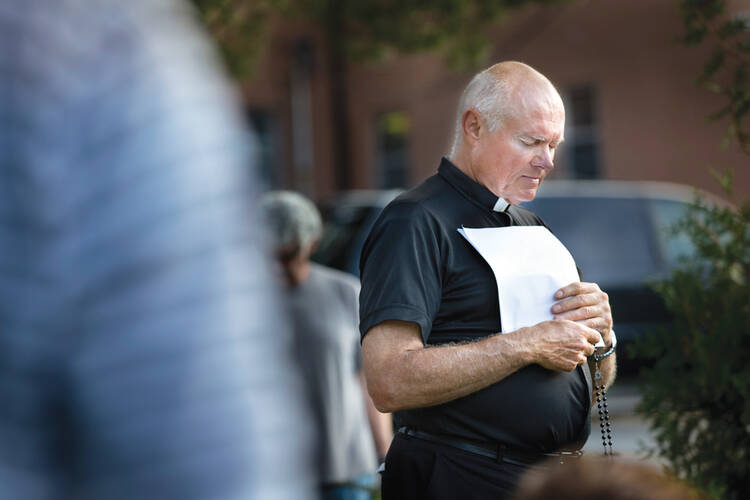As groups across the country held vigils to remember Michael Brown, a teenager whose death on Aug. 9 has sparked a wave of unrest in his Missouri hometown and raised questions about racial profiling and police militarization, religious leaders in the St. Louis area called upon “all people to pray for calm and peace and to be part of healing.”
“We must examine the tragic events taking place in the St. Louis area, seek to understand ‘Why?’ and work toward dismantling systemic racism,” read a statement on Aug. 12 from the Interfaith Partnership of St. Louis, which was signed by Archbishop Robert J. Carlson of St. Louis and the Rev. C. Jessel Strong of the African Methodist Episcopal Church. “Until the causes are addressed and rectified, there will be no change.”
In a column in The St. Louis Review, the archdiocesan newspaper, the Rev. Arthur J. Cavitt compared the unrest in Ferguson to “those fateful times in the 1960s and ’70s when parts of our cities erupted in flames. For many, the wounds haven’t fully healed; the underlying smoldering still exists.
“Systemic and personal racism have taken on less overt but no less sinister forms in the past few decades,” Father Cavitt continued. “None of our institutions are immune. It is found in government, including law enforcement and the criminal justice system; business and industry; and even in churches, regardless of denomination. These violations of the human spirit are being seen in the present generation: reactionary, disrespectful, destructive behavior within oneself, families and community. Where do we go from here? How are these insipid cycles ever broken?”
Father Cavitt is the executive director of the St. Charles Lwanga Center in St. Louis, which seeks to foster spiritual formation and leadership development within the African American Catholic Community.
Two miles from the demonstrations, members of Blessed Teresa of Calcutta Parish in Ferguson responded in perhaps the only way they could—they prayed.
“As a community, we needed to come together in prayer,” said Cathy Cunningham, a parishioner. “We just have to put it in Jesus’ hands, and he will heal us.”
Led by their pastor, the Rev. Robert Rosebrough, about 100 people gathered to pray the rosary at the parish’s Our Lady of Lourdes grotto.
“We don’t have the answers,” Father Rosebrough said. “We just ask for his presence and consolation; that’s what people need.”
In his column, Father Cavitt wrote that “our prayer should lead us to sound investing in our young people. We must inspire them to maintain and build their relationship with God for a greater sense of self and their role in this community and the larger world.”
On Aug. 14 President Obama addressed the nation, calling on the police investigating the shooting to be open and transparent. On the same night vigils were held across the country. From Maine to Michigan, Florida to New York, Vermont, Colorado and California, attendees wore red ribbons to honor Brown, 18. Many shared their stories of alleged police brutality, and called for a new compact between officers and civilians.








